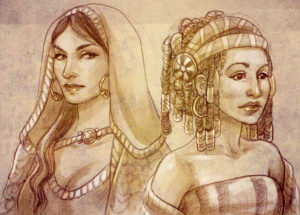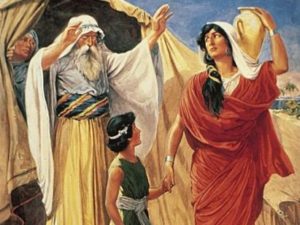
Hagar Means Flight; Sarai Means Princess
Are these Names or Descriptive Titles?
Ever since I remember reading the Bible as a youth I was taught that the titles of each person were their actual names. I was amazed how their parents knew what their children were going to be as adults. I first heard the proposition that these names were not names at all but simply titles given to each person driving home to the reading the testimony of each person. I began wondering what God would call me? What would be His title for me? What would be my legacy title by which generations would remember me? What is your title?
I was pondering the verses in Genesis describing the interplay between Abram, Sarai and Hagar and why it was so important that God devoted an entire chapter to this relationship (Ge 16). For those unfamiliar with this incident here is a brief recollection. Abram, meaning exalted father, had been promised a son by God (Ge 15:1-4). The problem is that Sarai was unable to conceive and she was passed the childbearing age (Ge 17:15-17). Both Abram and Sarai laughed at God’s pronouncement that she would bear a child and laughed at God in sarcasm (Ge 18:9-15). Hence, God said that the son’s name would be laughter, Isaac; only it was not sarcasm but a description of the peals of joyous laughter they expressed when the child was born a year later (Ge 21:1-7). God changed Abram to Abraham, father of many nations, and Sarai was changed to Sarah, presumably the princess of many nations. However, amidst this joyousness is a dark episode that did neither Abram nor Sarai credit.
Since neither Abram nor Sarai believed that God could awaken Sarai’s womb, Sarai followed the custom of her time. Slavery was a persistent institution throughout human history. Hagar was an Egyptian slave belonging to Sarai; if your Bible reads servant that is incorrect. A servant is a paid employee; a slave is property, entitled to nothing. Sarai suggested that Abram have a sexual relationship with Hagar until she became pregnant. Any child produced would be considered Sarai’s since Hagar was a slave. This is little different from today’s contractual arrangement whereby a woman agrees to be artificially impregnated with a man’s sperm, delivery the infant and give the infant to the infertile wife. True, the impregnated mother is not a slave and willingly enters into the arrangement; however, this has had the same consequences as Hagar. Motherhood or maternal instinct is difficult to ignore and not every contractual arrangement has gone as planned.

Hagar Chooses to Go Into the Wilderness
She Chooses to Die than Face Sarai’s Wrath
Hagar conceives. She suddenly envisions a new life for herself. Rather than remain a slave she sees herself at least as consort if not wife to Abram, a very rich man of his day. She acts as if she were suddenly Abram’s wife and Sarai were the slave. Today we would say, “It went to her head!” Pride can blind a person to the reality of one’s situation and such was the case with Hagar. Sarai was not only Abram’s wife but also his half-sister; again, a custom of their time and not of our time. This double bond was not going to be broken over Hagar carrying Abram’s child. When Sarai complained to Abram, he reminded her that Hagar was the slave, Sarai could treat her as she wished; and she did. Hagar brought down the wrath of the wife, “Hell hath no fury like a woman scorned!” Hagar was very poorly treated, abused we would say today, and had no recourse; she was a slave. Therefore, she chose to go into the wilderness alone. This was very dangerous for a lone woman could expect no mercy from anyone.
God intervened. The technical term, angel of the Lord, usually refers to a theophany, a pre-incarnate appearance of Christ. Christ meets Hagar, remember her name means flight, by a spring. He tells her two things. Go back! Hagar is in rebellion which brought Sarai’s wrath upon her. Running away would not make her situation better but actually put her and her child in mortal danger. God then tells her that her child shall be a father of a nation also. God’s promise to Abram to be a father of many nations would also pass down to Ishmael, meaning God hears. But since his mother was rebellious, he would also learn these ways and be rebellious as would his descendents. Hagar goes back, bears the son and he is named, Ishmael.

After Isaac’s birth, Conflict Arose
Abraham Sends Hagar, Ishmael Away
Several years later Isaac is born. Abram has been renamed to Abraham at this time. He is not a strong man. Twice before he gave his wife away to a more powerful man to maintain his safety and possessions and twice God protected her honor (Ge 12:10-20; 20). Her submission to a weak husband earned her high praise as an example to all women to trust in God through their husbands (1Pe 3:3-6).
When Isaac reaches the weaning age, approximately five years old, he is bullied by Ishmael (Ge 21:8-21). Sarai, renamed Sarah, tells Abraham to get rid of both Hagar and Ishmael. Abraham, being the strong man that he was, does not know what to do. God intervenes and tells Abraham to listen to Sarah and release Hagar as a free woman with her son. Abraham does so but not with generosity. He sends her into the wilderness without an escort ladened with only some bread and a skin of water. When the water is depleted Hagar goes a distance from Ishmael so she could not see him die and expected to die herself. Once again, Christ met her in the wilderness, reiterated His promise to her concerning Ishmael and pointed her toward a spring she had not seen previously. All is well; except, what lessons can we learn from this?
God never condones rebellion (1Sa 15:23). He would not have condoned Mr. King using a church to preach rebellion; violent or non-violent. God sent Hagar back into slavery rather than assist her in her rebellion for freedom, as it would be called today.
God uses the weak people of the world to work through, and Abraham was certainly a weak personality (1Co 1:26-29). Abraham did not receive faith because of his strong character. He became the father of the faithful because of his weakness through which the strength of God could flow (Ro 4:16-25; 2Co 12:1-10). Abraham could have been more generous when sending Hagar away, insuring her survival and safety. He was not a noble father-figure to Ishmael which probably furthered Ishmael’s stubborn and rebellious character.
Parents pass their positive and negative character traits to their children. Isaac is barely mentioned as an adult. He is a passive figure who does little but hang on to the legacy and tries to pass it on to the child of his choosing, Esau; not God’s, Jacob. Hagar, who sought to solve her problems by rebellious flight engenders rebellion in her son who chafed being second to Isaac.
Each of these titles describes some aspect of each person. Abraham became the father of all the faithful and Sarah was his princess to be honored and emulated by all faithful women. But, what title would God give to you? How would your life be described? One of faithful service or rebellious attitude, always chafing under authority regardless of one’s situation? Do you seek to be strong like Ishmael and Esau or weak like Jacob and cheat to obtain your goals? It was through the non-descript personalities like Abraham and Isaac that God worked. Jacob eventually learned this lesson but his sons and his descendents rarely understood that God shows His strength when we are weakest, and obedient. Can that be said of you? Can that be said of me? Sometimes not so much I am sad to say. What Title would God give us so others could know our testimony? He will tell us when we meet Him (Re 2:17).
